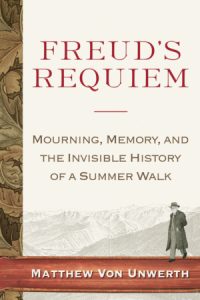Book Group Guide
The questions that follow are intended to enhance your group’s reading and discussion of FREUD’S REQUIEM by Matthew von Unwerth
Questions
- What is your overall impression of Freud’s Requiem? Of the ideas, arguments, and facts the author presents in this book, what stood out the most for you?
- On page 2, we are introduced to the argument at the heart of the book. Did you find yourself agreeing more with Freud, who believed that “beauty’s ‘scarcity value in time’ [gives] what is precious its worth” or Rilke, who believed that “mocked by its own frailty, beauty [is] eclipsed by its negation, and has no value and no meaning”?
- An underlying theme of the book is the way our sense of our own mortality affects the way we live our lives. How is this true for you? Has reading Freud’s Requiem affected your own sense of mortality? How?
- Freud developed many of the most important principles of psychoanalysis in the beginning of the last century, and yet, despite the advances of modern neuroscience, Freudian analysis and its offshoots remain popular. What is your personal experience with psychoanalysis, and what effect do you think “talk therapy” actually has in healing and/or enhancing creativity?
- In the end, Rilke decides not to pursue therapy with Freud, for fear that the process of analysis might affect his artistic creativity. Do you think there is a valid connection between madness and creativity? If so, do you think healing a psychological disorder could actually damage an artist’s creativity?
- Before reading Freud’s Requiem, how familiar were you with the real Sigmund Freud and his ideas? Did reading this book change your impression of him as a writer/philosopher/analyst?
- Likewise for Rilke: did reading the book change your impression of him as an artist and/or as a person?
- Rilke and Freud’s relationship was unusual both for the difference in their ages as well as for the contrast in their vocations. Are friendships between such dissimilar people rarer today than they were in the vibrant intellectual heyday of pre-War Europe? Can you think of any friendships in your own life that parallel this one? What advantages and disadvantages are there to a relationship between people with such disparate backgrounds and interests?
- Beyond her own accomplishments as a writer and psychoanalyst, Lou Andreas-Salomé seemed to have a dramatic, transformative effect on the men around her, from Freud to Rilke to Friedrich Nietzsche. Is there someone in your life you think of as a muse? What traits do people with such inspirational power seem to have in common?
- In the book, Matthew von Unwerth makes a strong case for Freud as a writer and thinker, even as an artist, beyond the scientific efficacy of the techniques he developed. Has Freud’s Requiem inspired you to read (or re-read) the works of Freud? How will having read the book affect the way you analyze Freud?
- Knowing more about an author or poet can sometimes dramatically affect how we interpret their work. Do you find yourself curious to read (or re-read) Rilke’s poetry? How will the things you learned in Freud’s Requiem affect the way you read Rilke in the future?
- When you finished the book, did you find that your opinion on beauty’s “scarcity value in time” had changed? Do you now support Freud’s notion that beauty is valuable because it is transient, or Rilke’s view that transience renders beauty meaningless? How do you think a person’s viewpoint on this issue might affect the way they live their life, as well as their overall happiness?

